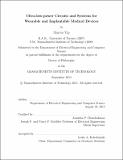Ultra-low-power circuits and systems for wearable and implantable medical devices
Author(s)
Yip, Marcus
DownloadFull printable version (54.97Mb)
Other Contributors
Massachusetts Institute of Technology. Department of Electrical Engineering and Computer Science.
Advisor
Anantha P. Chandrakasan.
Terms of use
Metadata
Show full item recordAbstract
Advances in circuits, sensors, and energy storage elements have opened up many new possibilities in the health industry. In the area of wearable devices, the miniaturization of electronics has spurred the rapid development of wearable vital signs, activity, and fitness monitors. Maximizing the time between battery recharge places stringent requirements on power consumption by the device. For implantable devices, the situation is exacerbated by the fact that energy storage capacity is limited by volume constraints, and frequent battery replacement via surgery is undesirable. In this case, the design of energy-efficient circuits and systems becomes even more crucial. This thesis explores the design of energy-efficient circuits and systems for two medical applications. The first half of the thesis focuses on the design and implementation of an ultra-low-power, mixed-signal front-end for a wearable ECG monitor in a 0.18pm CMOS process. A mixed-signal architecture together with analog circuit optimizations enable ultra-low-voltage operation at 0.6V which provides power savings through voltage scaling, and ensures compatibility with state-of-the-art DSPs. The fully-integrated front-end consumes just 2.9[mu]W, which is two orders of magnitude lower than commercially available parts. The second half of this thesis focuses on ultra-low-power system design and energy-efficient neural stimulation for a proof-of-concept fully-implantable cochlear implant. First, implantable acoustic sensing is demonstrated by sensing the motion of a human cadaveric middle ear with a piezoelectric sensor. Second, alternate energy-efficient electrical stimulation waveforms are investigated to reduce neural stimulation power when compared to the conventional rectangular waveform. The energy-optimal waveform is analyzed using a computational nerve fiber model, and validated with in-vivo ECAP recordings in the auditory nerve of two cats and with psychophysical tests in two human cochlear implant users. Preliminary human subject testing shows that charge and energy savings of 20-30% and 15-35% respectively are possible with alternative waveforms. A system-on-chip comprising the sensor interface, reconfigurable sound processor, and arbitrary-waveform neural stimulator is implemented in a 0.18[mu]m high-voltage CMOS process to demonstrate the feasibility of this system. The sensor interface and sound processor consume just 12[mu]W of power, representing just 2% of the overall system power which is dominated by stimulation. As a result, the energy savings from using alternative stimulation waveforms transfer directly to the system.
Description
Thesis (Ph. D.)--Massachusetts Institute of Technology, Department of Electrical Engineering and Computer Science, 2013. Cataloged from PDF version of thesis. Includes bibliographical references (pages 219-231).
Date issued
2013Department
Massachusetts Institute of Technology. Department of Electrical Engineering and Computer SciencePublisher
Massachusetts Institute of Technology
Keywords
Electrical Engineering and Computer Science.